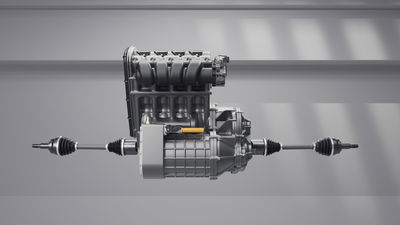That Time Ford Built An 'Eco' Mondeo ST With A Supercharged LPG V6

For most, LPG or autogas is about making heavy, large-engined cars like V8 Range Rovers (or if you’re my brother, a temperamental BMW E39 540i) just about affordable to run. There are numerous aftermarket conversion kits available, but over the years manufacturers have dabbled in cars made to run on the fuel - taxed at a much lower rate than petrol and diesel in many countries - from the factory.
The vast majority aren’t particularly exciting, putting an emphasis on running costs by pairing an LPG system with an already frugal smaller engine. But there was one mainstream manufacturer effort that promised to marry the green aspects of LPG with something a little more potent.
At the 1999 Geneva Motor Show, Ford revealed three distinct versions of the first-generation, face-lifted Mondeo. Two were production cars: the ST24-replacing ST200, and the 1.8 ‘AFV’ (alternative fuel vehicle). The final car, a concept, kinda/sorta combined both. It was called the ST250 Eco.
Yep, Ford was really keen to push the eco-friendly angle with the ST250, as evidenced by this little nugget from the press release:
“Ford’s exciting Mondeo ST250 ECO concept shows how enthusiast drivers can be environmentalists, too, with an alternative fuel vehicle (AFV) that is designed to be both quick and clean.”
As for the “quick” bit, that box was ticked with a big V6 engine. While the ST200 made do with a 2.5-litre six-banger developing 202bhp, the 250 had a 3.0-litre unit. With a supercharger attached. This brought the power to the 245bhp, an absurd for a front-wheel drive car in 1999.

The block and crankshaft came from the Taurus, while the 12-valve-per-bank cylinder heads were bespoke to the ST250. The supercharger was a “highly efficient” one supplied by Eaton.
The finishing touch came from Prodrive, which at the time was running Ford’s Mondeo BTCC car at the height of the legendary ‘Supertouring’ era. It developed an unusual “clutchless” gearshifting system that allowed drivers to either shift using buttons on the steering wheel or row through the MTX unit’s five speeds the old-fashioned way.
The car looked the part, too. Ian Callum penned a more aggressive body kit for the ST250, which included angrier bumpers, bigger side skirts, and a sizeable rear wing, and Ford promptly stuffed 18-inch multispoke wheels - big rims back then - under the arches. The suspension setup largely mirrored that of the ST200, with additional tweaks to the dampers and spring rates.
To fulfill the ‘Eco’ bit of the car name, Ford fitted a donut-shaped LPG tank in the spare wheel well, and an extra set of gas injectors to go along with the six petrol injectors. The conventional fuel filler cap was positioned on one side of the car, and the LPG filler on the other.

It wasn’t just a one-off show car, either: Ford is thought to have produced a handful of prototypes using a few ST200s. The car didn’t make it any further, however, and as far as we’re aware, all test mules were destroyed when the project was cancelled. Ford’s extensive heritage fleet certainly doesn’t include an ST250 or a 3.0-litre ST200, a quick call confirmed. Interestingly, one car purporting to have one of the ST250 3.0-litre prototype engines fitted popped up on eBay not so long ago.
Ford would eventually stick a 3.0-litre V6 engine in a Mondeo, but not until after the second-generation machine arrived, forming the ST220. As you’ve probably gathered from the name, it wasn’t as powerful as its concept predecessor. Nor did was it powered by LPG.
It seems a shame the ST250 never reached showrooms. Its intention to blend performance and efficiency came long before fast hybrid and electric cars were really a thing - it was ahead of its time, but thinking on different lines. And just think how temptingly cheap they’d have been on the used market by now…















Comments
Shout out for the BTCC in a car throttle advert! Am I dreaming?
*article
No idea why but every ST200 in sale in my country seems to be absolutely trashed.
Why didn’t the ST250 Eco go into production?
Pagination